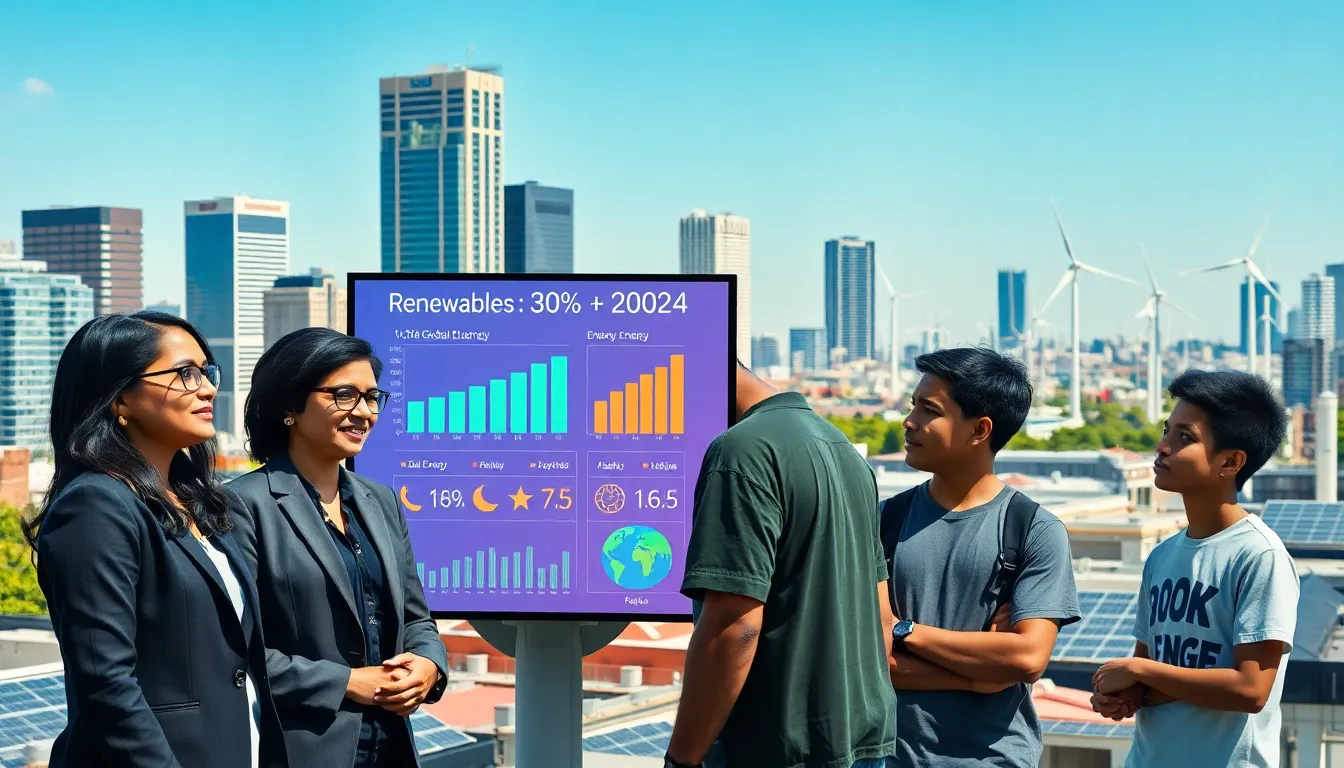Table of Contents
ToggleIn an era where energy demands and environmental concerns are at the forefront, understanding the evolving landscape of global energy production is crucial. The world is witnessing a major shift towards renewable sources and sustainable practices, all while grappling with the effects of geopolitics and technological innovation. This article explores the current state of global energy trends, delves into recent developments in renewable energy, examines the influence of geopolitical factors on energy production, and discusses the innovative technologies driving energy efficiency. Also, it highlights notable global events affecting energy dynamics and assesses public perception and policy changes responding to these challenges. Finally, it offers predictions for the future of energy markets, setting the stage for understanding the crucial intersections of energy, politics, technology, and society.
Current Global Energy Trends

The global energy landscape is continuously changing, shaped by shifting market dynamics and environmental necessities. As of 2025, data reflects a marked increase in the dependence on renewable energy sources. According to the International Energy Agency (IEA), renewable energy accounted for nearly 30% of total global electricity generation in 2024. This trend is projected to accelerate, particularly in developing countries where energy demands are rising rapidly.
Conversely, fossil fuel consumption remains significant, particularly in regions heavily reliant on oil and gas. The demand for natural gas, but, is experiencing a unique uptick due to its role as a transitional energy source. Notably, gas emits less carbon dioxide than coal, providing a bridge while the world’s energy infrastructure adapts to more sustainable solutions.
Summarizing, current global energy trends indicate a complex landscape where renewables gain momentum, but fossil fuels continue to play a critical role in meeting urban energy demands.
Renewable Energy Developments
Renewable energy developments are at the forefront of the global push toward sustainability. Key players, including China and the U.S., have significantly increased their investments in solar and wind energy. For instance, the growth in solar energy is particularly impressive: in 2024 alone, global solar capacity grew by over 20%, resulting in a new record of 1,000 gigawatts installed worldwide.
Technological advancements are crucial to these developments. Innovations such as more efficient photovoltaic cells and enhanced energy storage solutions, like lithium-ion batteries, have drastically improved the viability of renewable sources. Besides, offshore wind farms are emerging as a significant contributor, with projects in Europe and the U.S. demonstrating the potential for cleaner energy.
Governments and private entities alike are setting ambitious targets. The European Union aims to achieve net-zero emissions by 2050, providing incentives for renewable energy tech and funding green projects. As the world becomes increasingly aware of climate change and its impacts, the momentum toward renewables seems not just sustainable but inevitable.
Impact of Geopolitics on Energy Production
Geopolitical factors play a profound role in shaping energy production and consumption patterns worldwide. Recent tensions among major oil-producing nations have led to fluctuations in oil prices, affecting global markets. For instance, conflicts in the Middle East, combined with OPEC’s production strategies, have historically resulted in volatility, prompting countries to re-evaluate their energy security strategies.
Also, the Russia-Ukraine conflict has spotlighted Europe’s dependency on Russian energy. As a response, many European countries are investing in diversifying their energy sources, prioritizing renewable energy projects and seeking alternatives such as liquid natural gas (LNG) from the U.S. and other nations. This realignment is not only changing the energy landscape in Europe but also has significant implications for global energy politics.
In the long run, geopolitical events will likely continue to influence energy production, pushing nations to embrace energy independence through investments in renewables and enhanced domestic production.
Technological Innovations in Energy Efficiency
Technological innovations are revolutionizing energy efficiency across multiple sectors. From smart grid technology to advanced building materials, the emphasis is on reducing energy consumption while maintaining productivity.
Smart grids enable more efficient energy distribution, using AI to predict demand and supply cycles. This technology helps reduce outages and improve the integration of renewable energy sources into existing grids. In residential settings, smart thermostats and automated systems optimize energy use, showing individuals how to manage their energy consumption effectively.
Innovations in building design, such as energy-efficient windows and insulation, have made significant strides, enabling significant reductions in energy loss. The U.S. Department of Energy reports that such improvements can cut energy bills by up to 30%. As technology continues to advance, the potential for greater efficiencies and reduced environmental impacts becomes increasingly attainable.
Notable Global Events and Their Energy Implications
Significant global events often have profound energy implications. For example, the COVID-19 pandemic had unparalleled effects on energy consumption patterns in 2020, leading to temporary reductions in oil demand and a dramatic drop in prices. But, as economies recovered, energy-demand surged, resulting in steep price hikes and supply shortages.
Another notable event is the recent climate summits aiming to unify global efforts against climate change. These discussions have propelled nations to formulate stricter climate policies and embrace innovative energy solutions. The Paris Agreement continues to influence policy at national and global levels, pushing countries to commit to more ambitious carbon reduction targets.
These events highlight the interconnectedness of global issues and their effects on energy strategy, emphasizing the need for adaptability in the energy sector.
Public Perception and Policy Changes
Public perception of energy consumption and production is shifting, heavily influenced by growing awareness of climate change and environmental sustainability. Surveys indicate that a majority of the population supports renewable energy initiatives and is willing to pay more for energy sourced from renewables.
This change in public sentiment has prompted policymakers to enact more stringent environmental regulations. Policies aimed at reducing carbon emissions are becoming commonplace, with many states and countries implementing incentives for renewable energy adoption and efficiency improvements.
Also, transparency in energy sourcing is gaining traction, encouraging consumers to make informed choices about their energy usage. As awareness grows, it’s likely that policies will reflect this demand for sustainability, further accelerating the transition to cleaner energy.
Future Predictions for Energy Markets
Looking ahead, the future of energy markets appears dynamic and multifaceted. Experts predict a significant shift toward decentralized energy systems, supported by advancements in energy storage and smart technologies. As consumers gain the capability to produce their own energy, through rooftop solar panels, for instance, the traditional utility model is likely to evolve.
Also, as more nations commit to net-zero targets, the demand for renewable energy sources will continue to rise. This shift will likely result in new markets and investment opportunities within the renewable sector, potentially making it a cornerstone of the global economy.
Also, innovations in hydrogen production and carbon capture technologies are anticipated to play pivotal roles in energy futures. As sustainability becomes integral to economic growth, energy markets will likely shift towards a more inclusive approach, accommodating various energy sources in a cohesive energy strategy.
Conclusion
As the world navigates through an era defined by pressing energy needs and environmental challenges, understanding the factors shaping global energy trends is essential for individuals, businesses, and policymakers alike. From renewable energy developments to the geopolitical influences impacting oil prices, the landscape is intricate and evolving. With technological innovations driving efficiency and public sentiment steering policy changes, the future of energy markets holds promise for a more sustainable and resilient global energy framework. As we transition into this new era, it’s vital to commit to sustainable practices and embrace the energy solutions of tomorrow.







